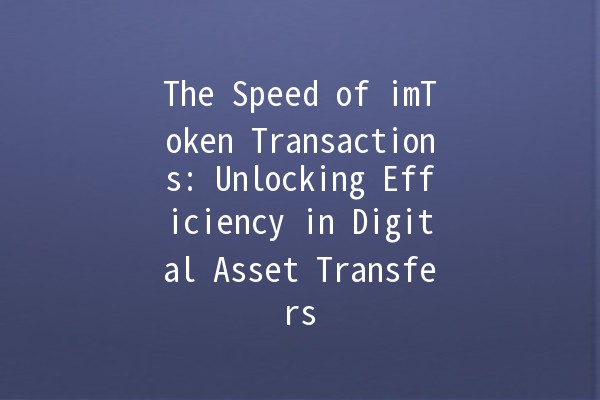




In the world of cryptocurrency, transaction speed can often determine the success or failure of a given trade. Users of imToken, a leading digital wallet for Ethereum and ERC20 tokens, often inquire about how transaction speed can impact their experience and what can be done to optimize it. This article delves into the factors that influence transaction speeds in imToken and offers practical tips to improve the efficiency of your digital asset transfers.
One of the primary factors affecting transaction speed is network congestion. When a high volume of transactions occur simultaneously, it can lead to delays. Ethereum, the blockchain protocol that underlies imToken, operates with limited throughput, meaning only a certain number of transactions can be processed at a given time.

Practical Tip: To avoid delays during peak times, consider monitoring network congestion through Ethereum gas trackers. These tools provide realtime data on gas prices and recommended transaction fees, allowing you to time your transactions more effectively.
Gas fees are the charges paid to miners for processing and validating transactions on the Ethereum network. Higher gas fees generally incentivize miners to prioritize your transaction, thereby speeding up the process. Conversely, opting for lower gas fees could lead to slower transaction confirmations, especially during times of high demand.
Practical Tip: Adjust your gas fees based on urgency—if a transaction needs to be completed quickly, prepare to pay higher fees. imToken's user interface allows you to set custom gas fees, providing flexibility according to your needs.
The type of transaction can also affect its speed. Simple transfers of ETH or ERC20 tokens are usually processed faster than more complex transactions, such as those involving smart contracts.
Practical Tip: For urgent trades involving smart contracts, preapprove transactions or utilize tools designed for faster execution. Certain decentralized exchanges (DEX) are optimized for speed, so consider using them for rapid swaps.
The Ethereum network undergoes periodic upgrades, known as forks, which can influence transaction speeds. Some upgrades enhance scalability and performance, while others may temporarily slow down the network during the transition period.
Practical Tip: Stay informed about Ethereum network upgrades. Following official Ethereum channels or credible crypto news sources can keep you updated about any changes that might impact transaction speeds.
The performance of your digital wallet, including imToken, can also affect transaction times. Factors such as device performance, app version, and storage can influence how quickly transactions are initiated and confirmed.
Practical Tip: Keep your imToken app updated to the latest version for optimal performance. Additionally, ensure that your device meets necessary performance standards, especially if you're handling a large volume of transactions.
Batch transactions allow you to bundle multiple transactions into one. This can significantly reduce the number of confirmations needed, thus speeding up the overall process.
Example: If you need to transfer tokens to multiple recipients, batch your transactions to avoid processing each one individually. Many DApps support this function, making it easier to manage.
Utilize gas trackers to stay informed about current gas prices. Prices fluctuate based on network demand, so knowing when to transact can save time and money.
Example: Use platforms like Gas Station Network to find the best times to send transactions with lower fees while ensuring speed.
Configure notifications on your wallet or thirdparty apps to alert you when gas prices drop or network congestion levels ease.
Example: Many users set their wallets to notify them when gas prices fall below a certain threshold, allowing them to execute transactions when conditions are more favorable.
You might consider using Layer 2 solutions or alternate blockchains that support ERC20 transactions, which may offer faster confirmation times and reduced fees.
Example: Networks like Polygon or Optimistic Ethereum can facilitate quicker transactions at lower costs, enhancing your overall transaction experience.
If you frequently engage in trading or complex transactions, consider implementing preapproved smart contracts that can execute trades automatically, minimizing delays.
Example: Automated trading bots can monitor market conditions and execute trades based on preset parameters, thus ensuring speed and efficiency.
imToken is a cryptocurrency wallet that allows users to store, manage, and transact with digital assets like Ethereum and ERC20 tokens. It provides a userfriendly interface, making it popular among cryptocurrency traders and holders.
Transaction speed directly impacts how quickly your trades are completed. Slow transaction speeds can lead to missed opportunities, especially in the volatile crypto market where prices can change rapidly.
You can control factors such as the gas fee you set, the timing of your transactions based on network congestion, and the choice of whether to batch transactions or use faster solutions.
There are several online platforms and tools like Gas Station Network and EthGasStation that track and display realtime gas prices on the Ethereum network, helping users determine the best times to transact.
If your transaction is delayed, you can check its status using a block explorer. Additionally, adjust your gas fee higher (if supported) to prompt miners to process your transaction faster.
Yes, setting a low gas fee may result in your transaction taking longer to confirm or potentially failing. This is particularly risky in fastpaced market conditions where timing can be critical.
By leveraging these strategies and insights, users can greatly enhance their transaction speeds within imToken, making their digital asset management more efficient. It’s essential to stay proactive and informed in the everevolving landscape of cryptocurrency to ensure the best possible experience.